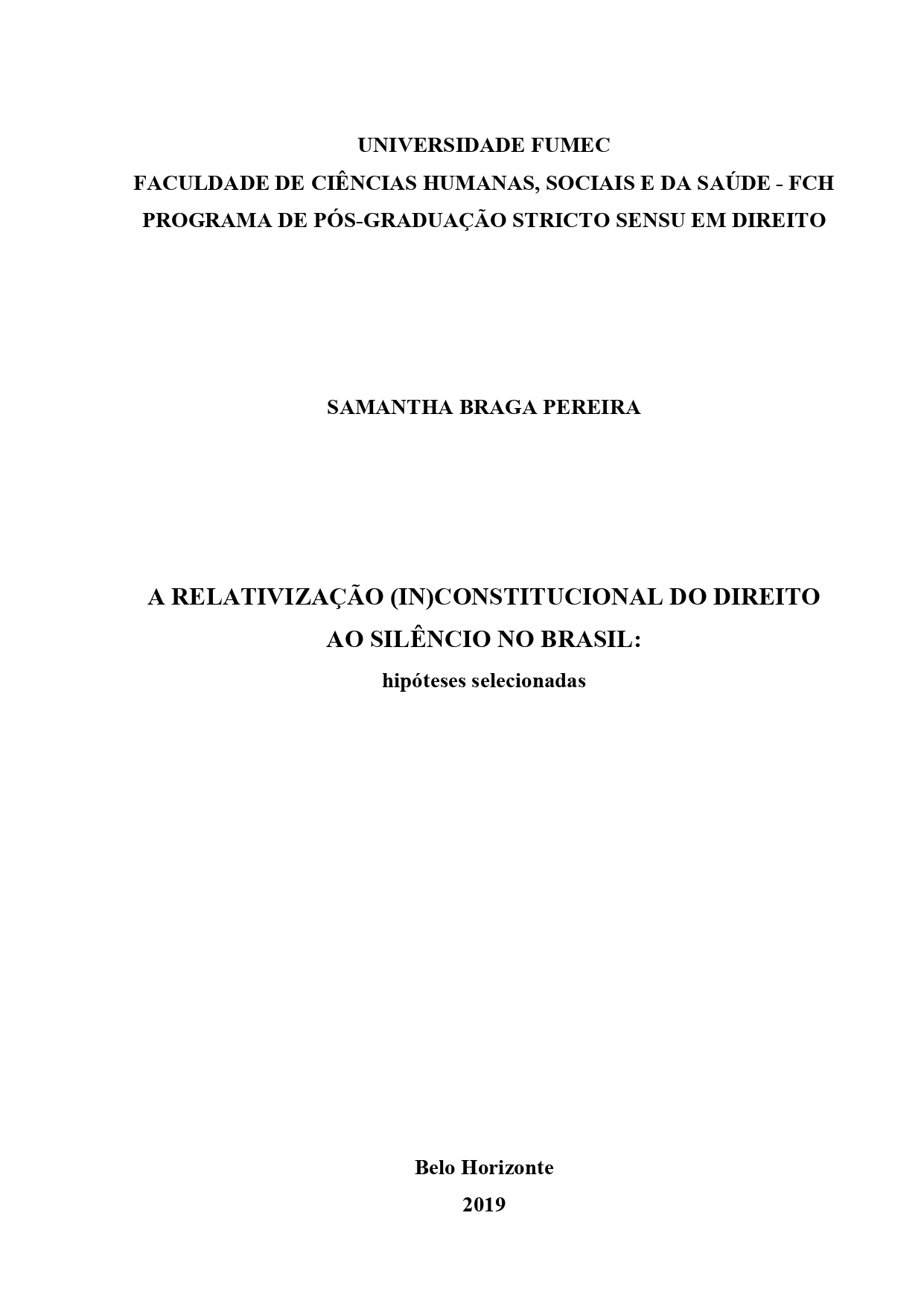A relativização (in)constitucional do direito ao silêncio no Brasil: hipóteses selecionadas

Visualizar/
Data
2019Autor
Pereira, Samantha Braga
xmlui.mirage2.itemSummaryView.MetaData
Mostrar registro completoResumo
O trabalho tem como temática a relativização do direito ao silêncio no Brasil, e busca indagar,
como problema de pesquisa, se o direito ao silêncio, consubstanciado num direito amplo e
irrestrito de negativa de produção de provas autoincriminatórias, é respeitado pelo Estado.
Como hipótese, afirma que é inconstitucional a relativização dos direitos e garantias
decorrentes do conceito amplo do silêncio, por quaisquer entes ou órgãos estatais. Adota
como marco teórico a conceituação do Supremo Tribunal Federal ao longo do período pós-
Constituição de 1988, segundo a qual o direito ao silêncio, também chamado de garantia de
não autoincriminação, alcança direitos amplos de exercício absoluto de não produção de
provas autoincriminatórias, não se limitando ao direito de permanecer calado, tal como
disposto na Constituição. Analisa a origem do direito ao silêncio, os conceitos amplo e
restritivo do alcance desse direito na doutrina brasileira, o conceito formado pelos julgados do
Supremo Tribunal Federal desde a Constituição de 1988, e a aplicação desse direito nos
Estados Unidos da América e em Portugal. Apresenta a legalidade material como princípio
que exige para validade e vigência das normas, que estas não contrastem com direitos e
garantias fundamentais estabelecidos pela Constituição como cláusulas pétreas, e estabelece
que às criações legislativas e à interpretação judicial é inconstitucional impedir, relativizar ou
penalizar o exercício do direito ao silêncio e da garantia de não autoincriminação. Analisa o
período pré-Constituição de 1988 para a compreensão do cenário assecuratório de direitos e
garantias individuais no qual foi fundada a Constituição, conceitua e posiciona o direito ao
silêncio e a garantia a não autoincriminação nesse rol, e analisa a extensão da proteção que a
Constituição de 1988 concedeu a esses direitos e garantias ao dispor que são cláusulas pétreas.
Conclui que há a relativização do direito ao silêncio no Brasil a partir da constatação da
existência de situações em que se admite a realização compulsória de provas
autoincriminatórias, ou em que, apesar de permitido o exercício do direito a não produção
dessas provas, aplica-se presunção de culpa ou punição em razão da invocação desse direito.
O desenvolvimento do trabalho se deu por intermédio de pesquisa bibliográfica, pelo método
dedutivo, tendo como fontes bancos de teses, dissertações, monografias, artigos, periódicos,
livros físicos e digitais, legislação, e julgados do Supremo Tribunal Federal e do Superior
Tribunal de Justiça. The work has as its theme the relativization of the right to silence in Brazil, and seeks to
inquire whether the right to silence, consubstantiated in the broad and unrestricted right of
refusal to produce self-incriminating evidence, is respected by the State. It proposes as
hypothesis that it is unconstitutional the relativization of these rights and guarantees by any
entity of the functions of the State. In order to reach the proposed hypothesis, the work uses as
a theoretical framework the conception built by the Federal Supreme Court over the years
after the 1988 constitution, according to which the right to silence, also named as guarantee of
non-self-incrimination, reaches all kinds of non-production rights of self-incriminating
evidence and is not limited to the right to remain silent explicitly set forth in the Brazilian
Constitution. The analysis studies the origin of the right to silence in the western scenario, its
concepts and scope in current Brazilian law, it ́s concept created by the judgments of the
Federal Supreme Court along the years after the 1988 Constitution, the concept and the
application in the United States of America and in Portugal. The work presents the material
legality as a principle that requires, in order to be validated as legal norms, that they cannot
contrast with fundamental rights and guarantees established by the Constitution as stonework
clauses, and establishes that neither through legislative creations nor through judicial
interpretation is possible to suppress, modify, reduce, deny the exercise or establish penalty to
those who exercise the right to silence. Then, it analyzes the period pre-Constitution of 1988,
to understand the scenario that gave rise to new rights and guarantees, conceptualizing and
positioning the right to silence in this role and analyzing the protection that the Constitution
of 1988 granted to these rights and guarantees by providing them as immutable clauses. Thus,
proposing that the relativization of the right to silence in Brazil is unconstitutional, it analyzes
that compulsory realization of self-incriminating evidence in Brazil is admitted, and
introduces two critical analysis of situations in which, although the right to not produce
evidence remains, there is a suppression of the right to silence, since there is presumption of
guilt or punishment due to the invocation of that right. The development of the work was
made through bibliographical research, having as sources theses, dissertations, monographs,
articles, magazines, physical and digital books, legislation, and judgments of the Federal
Supreme Court and the Superior Court of Justice.
